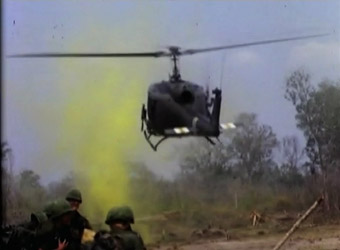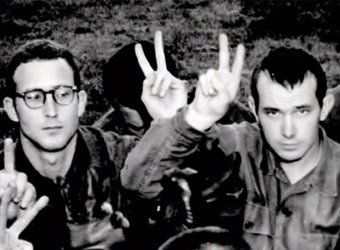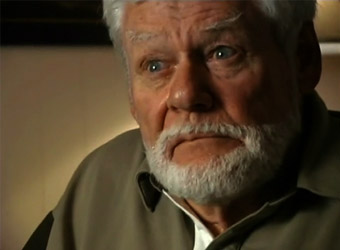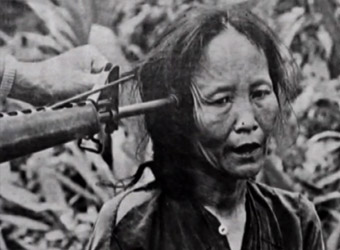| |
"What's the pride in saying you're a veteran if you're a veteran in something wrong?" |
| |
Donald Duncan – U.S. Army Special Forces |
| |
"Obedience To The Law Is Freedom" |
| |
Sign outside the notorious San Francisco Presidio
Stockade
(Had no one heard of Auschwitz in the 60s?) |
This is an absolutely cracking documentary. Why? Because it has just rewired my brain and I'm a better person for that rewiring. Originally released in 2005, Sir! No Sir! tells a story that America originally did not want internationally acknowledged. Uh, you think? I guess we are far enough away from the events now and all parties must concede that the U.S. intervention in Vietnam was at best horrifically misguided and at worst, a genocide of sorts. Its parallels to Iraq don't exactly go unnoticed and as an extra on the disc there's a short anti-recruitment music video using footage from the movie. Director David Zeiger is really going for the highest chevronned jugular he can see pulsing in fury at his little, nasty, dark secret of a movie, a movie that anyone interested in that turbulent period and thinks they're well informed, should see. If history were taught this well in schools I wouldn't need a mnemonic (nor Wikipedia) to tell me the order and fate of Henry VIII's wives.

I thought I was reasonably clued up on some basic historical events (I wasn't born when the Vietnam War started and was 14 when it finally ended) but it seems I was wrong. I am glad to be wrong when I can be steered down the right path by a passionate piece of work. Here's a question. And I'd love to ask a group of Americans but it will have to be a voice in the cyber-dark for the moment. Why did the US pull out of Vietnam and not keep going until it 'won'? I would be fairly confident that most people would answer 'flower power', Jane Fonda, hippies, peace marches, civilian pressure and the massive unpopularity of President Tricky Dicky Nixon (not his full name) who had to resign due to his involvement in the Watergate scandal but managed to negotiate a ceasefire with the North Vietnamese a year earlier.
Well, it seems like there is another player in the mix, another rising (armed) force from whose DNA the peace movement essentially grew. And it's a real shocker. It seems as if the men and women of America who did more to change the world were those who took an oath to defend their country with arms – the humble GI, Government Issue, the nickname for the common soldier. Let me digress a moment and throw a Bill Hicks quote at you. "Gays in the military...here's how I feel about it, alright? Anyone DUMB enough to want to be in the military, should be allowed in. End of fucking story. That should be the only requirement." Now I'm quoting that somewhat ironically to suggest that there actually was an era when the 'grunt' thought for him and herself. Individuals realized they were killing people or helping to kill people who were non-combatants. They had to come to terms with the fact that their country was ordering them to murder, to act immorally and that stuck mightily in their craws. Knowing courts martial awaited them, they made their peace with their consciences and one by one they refused to obey orders.
One of the most joyous pieces of archive footage I've ever seen is that of the liberation of both France and Holland in the aftermath of the Second World War. The joy and relief that it was all over and the 'good guys' won was palpable. Soldiers then were fighting a war that was easily understood. A small, charismatic (well, he must have been) mustachioed bastard was sweeping across Europe invading countries and crushing them under Nazi jackboots. It was an awfully simple thing to grasp. Fight for your country or you and your country's had it. The Vietnam War, by contrast, was a war on an idea fought out of fear. You can't kill an idea with a bullet. Because of President Johnson's strategy of 'containment', there was never an over arcing goal and therefore victory as a plan. It was an attempt to help South Vietnam not be overrun by the Communist North Vietnam and unlike in WWII, the enemy could be anyone except those wearing the same uniform as yourself. Consequently this brought out the very worst in soldiers trained and indoctrinated to believe that they were fighting the good fight. Some massacred because daddy told them they could and some rebelled. It's clear who were the braver.

The fates of those that went against Uncle Sam are not hard to guess. When Special Forces Donald Duncan resigned, he did so as a decorated American hero whose disillusionment with his own government prompted articles and even a book destroying the ridiculous happy-happy joy-joy myth that the powers-that-were were hypocritically spinning to an ignorant populace. But at least he wasn't imprisoned for his views or shot dead for resisting arrest or trying to escape the stockade. Some of these people who opposed the war from inside the Army did it knowing that their prison sentence may be in the tens of years. That's moral courage of the highest order. But what was so surprising wasn't the fact that soldiers were making these choices. It was the enormous number of them that were feeling the same way. After Martin Luther King was assassinated in 1968, the African American Civil Rights Movement sort of amassed with the anti-war demonstrations and as a significant percentage of GIs were African American, this only fuelled the dove-shaped creature that fluttered in the belly of the military beast. One colonel summed up the quiet uprising as an 'infestation'. In truth, it was a cancer that almost toppled the fighting force of the world's greatest super power.
I was staggered to learn that over 50,000 souls deserted the U.S. Army during the Vietnam War. As my partner pointed out, most of those desertions would've been driven by fear but a hefty amount (one must conclude) were because they had worked out that the government of the country they had offered up their very lives to defend, had stepped one step too many towards the dark side of perceived self interest in international affairs. The Vietnam War was no longer about stopping the 'evil ' spread of communism. It was about genocide. I was even more staggered to learn that US political success in Vietnam was officially calculated by dead Vietnamese bodies. The soldiers – a lot of them whom we may call children or 'young adults' – were told "Kill because one of them may kill you." I was reminded of a pearl of 'enemy' wisdom that leaked out during the abortive raid on Mogadishu dramatized by Mr. Scott in Black Hawk Down. "The weakness of the American soldiers is that they are afraid to die..."
In essence, you had American teenagers with guns who couldn't tell an enemy North Vietnamese from a 'friendly' South Vietnamese and so shot to kill absolutely everyone. Was it such a surprise to hear about the My Lai massacre? Perhaps it wasn't – not to us now, but then? It ripped through US consciences like electricity through water and suddenly enough was enough. Ma and Pa Cornstalk in middle America had a solid fact to chew on and they spat it right back out. This cruelty was not right. It sullied America and America wanted its marines clean. We've since had many examples of how far the right would push morality (if it's good for us, it's good, period) but in the late 60s that didn't and correctly should never have washed. The times they were a-changin'.

America in the 50s and 60s was slowly undergoing a cultural revolution. With the internet and world wide web a gleam in Mr. Gore and Mr. Berners-Lee's eyes, organizing anything was a practical nightmare. There was no way to coordinate things and people without really hands-on organizing things (and not just sending an email to one of your address book groups asking each friend to do the same). And it was dangerous and foolhardy (and brave) for enlisted men to meet clandestinely and organize peace rallies. Allow me a small digression. At one of the military towns, the rebelling GIs used to meet up at a café named after the hydraulic piece of kit that allowed the wheels of a helicopter or plane to gently absorb the impact of landing. It's a name I now assign to the personification of the GIs battle. Ready? It's called "Oleo Strut". Gorgeous. If you love words, that's got to floor you.
The first caught by THE MAN, those at the vanguard of saying "No," were made examples of and one was even shot dead 'as he tried to escape'. But the idea of military resistance from within grew and grew and when the water boils, whistles start blowing. The horror that was jungle warfare was fought to reassure a small number of frightened, powerful men at home. There was no Hitler to topple, just nameless Vietnamese people to slaughter. When the situation reached breaking point, GIs kept asking "Why are we doing this?" Some went crazy but some turned inward and started to tunnel their way out of the military monster. One way was to produce anti-Army newspapers (probably more rag-mag than The Times) but they worked in disseminating information – sometimes sensitive information – information that Nixon and company would have taken lives to keep secret. Let's look at this from the perspective of those in charge (if that's possible). Military men and women (especially in the States) take an oath to defend their country. They are trained to take orders from their superiors and hell awaits if they disobey. They perhaps naively assume that anyone they are ordered to kill has it coming ten ways from Sunday because America is right, right? There is a basic moral code to be obeyed and America will always toe the line, right?
These presidents who orchestrated this terrible conflict, these frightened men whose fear killed millions relied on their army's reputation, hardware and the given as the most concrete given, the fact that men and women will do what higher ranked men and women tell them to do. I think it's true that you can't hypnotise someone into doing something they'd find morally repugnant. Same here; repugnance at what they were being asked to do coupled with there being no 'good guys' and 'bad guys' on the playing field. Let's not even mention the wooly reason why they were there in the first place. I want to write more but it will spoil the eye opening experience of watching Sir! No Sir!
Watch it. This stuff needs to be out there. Watch it and tell a friend. David Zeiger? Great job. Stand down and let your movie speak volumes for itself.
Despite being released in 2005, the film is presented in 4x3 straight, no chasers, (1.33:1) probably due to the fact that except for the interview material, the rest of the archive is of course 4x3. And it feels right too. It seems somehow more truthful an aspect ratio (and yes, I am aware how dumb that sounds). Shot on DV with 35mm and 16mm inserts, the picture quality varies dramatically but then what else would you expect?

The stereo Dolby Digital is fine and all words are clear and only some historical footage contains hiss and pops. Some archive looks as if it's been re-dubbed.
I don't usually praise company logos but I have to say the sound effects (very Lynchian) and the dark water, light and passage was eerily effective at creating mood before we'd seen a frame of film – Stoney Road, very nice.
Trailers (8' 11")
A threesome of trailers, Winter Soldier, FTA and Sir! No Sir! The latter movie has taken footage from the first two films and the message of all three is the same – all deeply upsetting, angry and revelatory. Winter Soldier seems to be a film of testimonials by earnest and deeply affected soldiers all giving their evidence before the media. You get the strong impression that the Vietnamese people were regarded as animals for sport. With permission from on high, anything went and some took that to the most horrific extreme. Doubt there's a lot of laughs in Winter Soldier but even the trailer is eye-wideningly compelling.
FTA (standing for Fun, Travel and Adventure or Fuck The Army, take your pick) is the story of one of the most famous aspects of the peace movement during the 60s – Jane Fonda and Donald Sutherland's FTA road-show. Again, even the trailer is surprising, the amount of GI support the road-show had garnered. While I admire and rate both performers and their commitment, I'm not sure how intrinsically entertaining the actual show would be to today's audiences. But then, it is the film of the show and not the show. A sign of the times. Who is today's equivalent? Sean Penn's been to Iraq. Not sure he does a show though...
Ruckus Society Flash Punk Ass Crusade (5' 26")
In essence, it's an anti-recruitment flash animation short using footage from Sir! No Sir!'s trailer. The critical rap soundtrack mixed with samples from 50s commercials accompany facts and figures from the Vietnam War. It's effective and another sign of the times – a lot of the words are in mobile phone text language and it's got a strong scent of urgently wanting to appeal to younger viewers. Don't feed the beast, indeed. The end music cuts out instead of either stopping or fading. Odd.
Eye opening is too insipid a phrase to use. This staple guns your eyelids to your forehead and you don't even feel it because of the shock at what you're watching and hearing. What comes over sub-texturally in every frame is the immense fear of the authorities, the raw stench of panic as they begin to understand that human beings are not automatons sent to do daddy's bidding. They have moral compasses that will not point north even if that's the order. The fact that so, so many GIs participated in the movement is a testament to human decency and a dent in the super-power's super powers, one which would be welcome at anytime. The forces in Afghanistan and Iraq probably have the most potent reminders of why they're fighting but I'd like to think the smart ones know that they are always lied to by those they serve... Just see this and have your eyes opened.... Bravo.
|